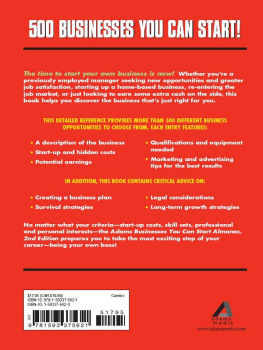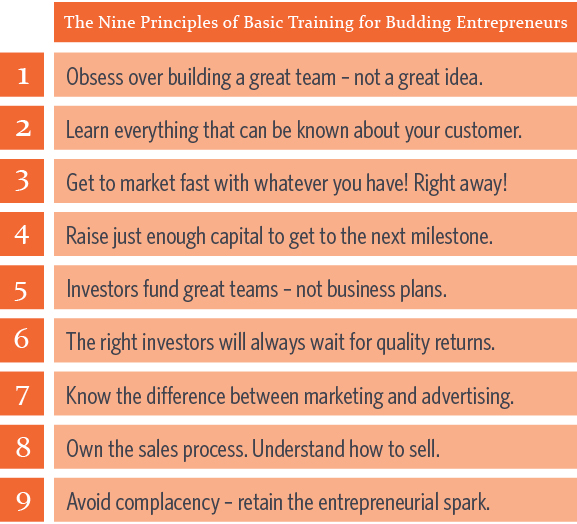Main Idea
There are many myths about starting a business which are distracting and misleading for aspiring entrepreneurs, for example:
- I have a great idea for a new business. Now all I need is $10 million to get the company on its feet and going.
- I have a new idea thatll be a billion dollar business all we need is a tiny slice of the $50 billion Internet market.
- All I need is enough money to do some good advertising, and then my business will be able to go public in a couple of years.
- This is such a great new idea that no one has ever thought of it before we will have no competition.
Anyone who believes these myths needs a good swift kick in the pants because they have nothing to do with how successful companies are actually started and grown in the intensely competitive winner-takes-all battles of the real world. Unless a potential business builder can ignore the hype and get back to the fundamentals, they stand little chance of success.
So just what, exactly, are the fundamentals of starting and growing a business? There are nine principles and five milestones:
In essence, unless you stick to and handle the fundamentals well, nothing else really matters youll simply end up as roadkill on the highway to success. Pure and simple, a business exists to make money. Unless you have a straightforward and logical way to achieve that, dont even bother starting a new company youd be better off working for someone else who does.
Ive been involved with new businesses for all of my working life, and Im incredulous that the entrepreneurial path has been so polluted. Who believes all this junk? Believe me, its not just the technohip I-want-to-retire-by-the-time-Im-thirty crowd. I hear experienced corporate executives say things like, The Internet represents a $50 billion market, and we will capture one-half of one percent of that. People whove spent decades building sophisticated technology will say, All I need for marketing is some advertising. Or consider this, from a Fortune 500 stalwart spinning out a new business unit: We have no competition. What I say is Dream on! You need to calibrate your BS meter. Let go of all the crap people believe about the startup enterprise. There is only one path to success in a startup. Whats that? Hard work and adherence to the fundamentals.
ROB ADAMS is the founder and managing director of AV Labs, an early-stage venture capital company. Prior to establishing this company, he worked for Lotus Developments (where he helped launch Notes and 1-2-3 for Macintosh), Pervasive Software (which he helped take public in 1997) and Business Matters (a financial forecasting and modeling company which he founded). Mr. Adams has an engineering degree and an MBA.

Avoid complacency - retain the entrepreunarial spark
The only way for a large business to continue growing is to act as if it were a startup. Mature companies become fixated on defending their market share whereas startups focus on stealing market share from others. The key to long-term success for any business enterprise is to retain an entrepreneurial mind-set.
Any company that becomes highly successful in the marketplace is certain to have a whole host of startups nipping at its heels. If the established company tries to defend its position at all costs, it will stop innovating and thats a certain route to getting out of synch with the changes occurring in the marketplace. Therefore, the only way to stay on top once youre there is to continue acting like a startup.
Specifically, a mature company can act like a startup by:
- Making certain that every new hire actually adds value rather than simply adding to the overall infrastructure costs of the business.
- Rewarding the people that add the most value in the same ways startups do with bonuses, promotions and opportunities to have equity in whats being developed.
- Continuing to do market validation focusing on whatever is causing pain for customers and the best ways to actually develop products that fix that pain.
- Aligning everyone around a common company vision so everyone is one the same page and focusing on achieving the same outcomes for customers.
- Developing new products that synch with the core competencies of the sales model meaning the new products will be properly priced and positioned so the sales force can be properly motivated and rewarded.
- Having an entrepreneurial mind-set which means rewarding great ideas, giving them space to grow and providing sufficient autonomy so the people involved can do what will be required.
- Cutting the bureaucratic red tape and allowing decisions to be made quickly with a minimum of fuss.
- Taking some risks grabbing opportunities that arise and running with them to see how they pan out.
- Encouraging people to solve the customers pain rather than worry about internal turf wars or other distractions. Ideally, every internal presentation should be based on which customer pain is being addressed.
- Sticking to what your organization is best at and bringing on board partners who can provide other skills and technologies.
- Creating small, dynamic teams and units since they will always be more agile and more responsive to the needs of the customer than any large business division.
- Keeping next-generation R&D alive even in the face of the usual demands to generate results this quarter.
- Maintaining direct contact with the customer.
- Being prepared to iterate and improve products over time.
- Creating value in every step.
Dont worry about your business plan. This is little more than a corporate brochure. Instead, think execution intelligence. Customers. Product to market. Handle those issues, and the plan writes itself. Not only that, but your presentation before investors will be sharp, thorough and compelling. The investors will be all the more likely to hand over the cash you really need.
Rob Adams
Remember, there are no magical formulas. You need to learn how to manage known risks. Validate the market. Assemble a great team. Develop a profitable business model. Execute as perfectly as possible. All the while, know this: If you step up to the plate to start a company, youre taking a chance youll strike out. No matter what you do. While there are variables you can control, there are many you cant.
Rob Adams
It sounds like an oxymoron, but when youre a small company, you have to think really big, and when youre big, you need to be able to think real small. When a company gets very large, people tend not to be able to grasp the complexity of where theyre going. Big companies have to help people understand the larger vision and how their work aligns with the overall goals. Breakthroughs happen when people comprehend the whole picture and their unique role in contributing to that vision.
Mike Turner, CEO, Waveset

















![Ernest Adams [Ernest Adams] - Fundamentals of Adventure Game Design](/uploads/posts/book/119415/thumbs/ernest-adams-ernest-adams-fundamentals-of.jpg)




 Avoid complacency - retain the entrepreunarial spark
Avoid complacency - retain the entrepreunarial spark